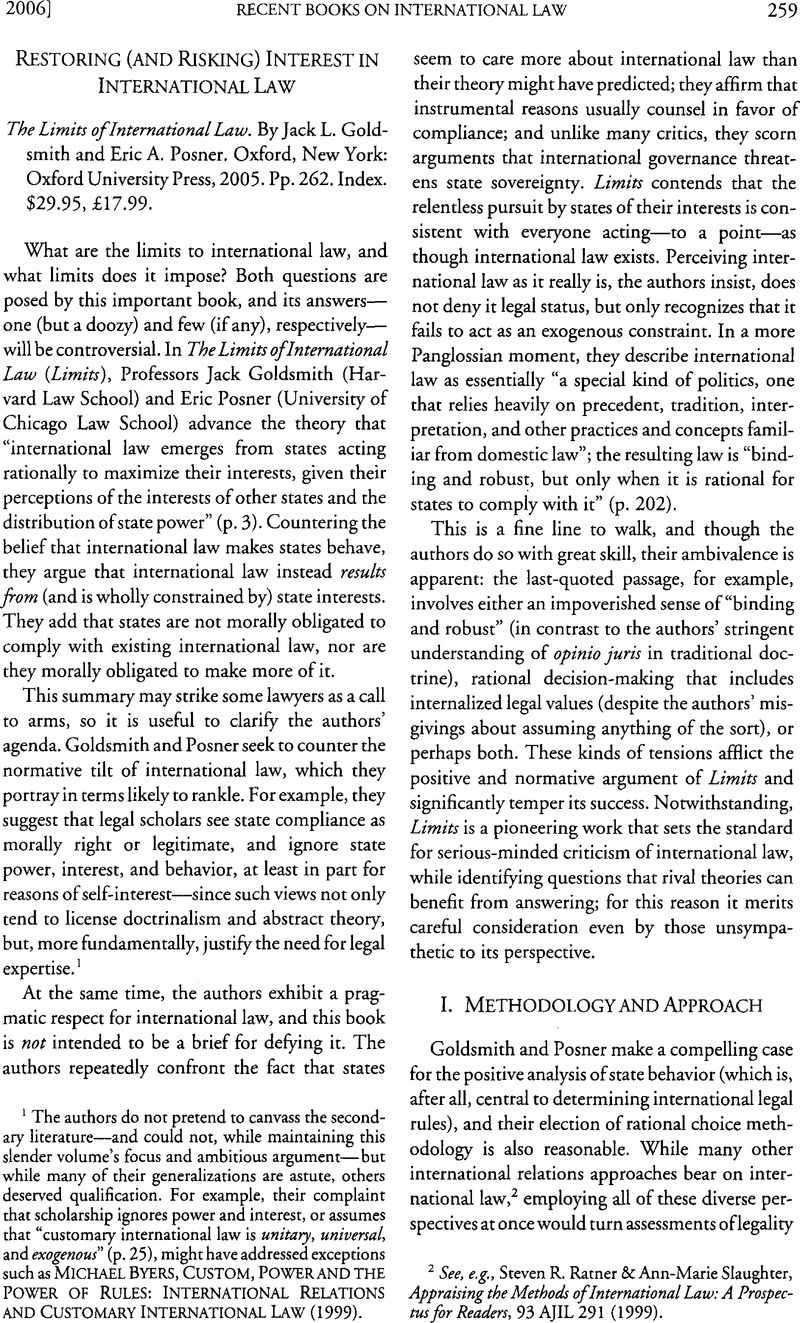Published online by Cambridge University Press: 27 February 2017

1 The authors do not pretend to canvass the secondary literature—and could not, while maintaining this slender volume’s focus and ambitious argument—but while many of their generalizations are astute, others deserved qualification. For example, their complaint that scholarship ignores power and interest, or assumes that “customary international law is unitary, universal, and exogenous” (p. 25), might have addressed exceptions such as Byers, Michael Custom, Power and the Power of Rules: International Relations and Customary International Law (1999).CrossRefGoogle Scholar
2 See, e.g., Steven, R. Ratner & Ann-Marie, Slaughter Appraising the Methods of International Law: A Prospectus for Readers, 93 AJIL 291 (1999).Google Scholar
3 This is not to say, however, that their own application of traditional doctrine is beyond challenge, including their claims that threats of retaliation or failed treaty discussions belie the existence of customary international law rules (pp. 50-51).
4 See, e.g., International Law Association, Final Report: Statement of The Principles Applicable to the Formation of General Customary International Law §l(i) (2000).
5 For reasons of space, I will not describe this literature here. For a recent example, see Norman, George & Joel, P. Trachtman The Customary International Law Game, 99 AJIL 541 (2005)CrossRefGoogle Scholar; for my own views, see Edward, T. Swaine Rational Custom, 52 Duke L.J. 559 (2002).Google Scholar
6 This is not clear. For example, Thomas Nagel, whom the authors invoke for the requirement that duties be “motivationally reasonable,” nonetheless recognizes a political conception of morality entailing more modest duties—ones that better approximate the claims commonly made upon states. Nagel, Thomas The Problem of Global Justice, 33 Phil. & Pub. Aff. 113, 130–32 (2005).Google Scholar
7 W. Michael, Reisman International Incidents: Introduction to a New Genre in the Study of International Law, 10 Yale J. Int’l L. l (1985)Google Scholar.
8 See, e.g., Pierre-Hugues, Verdier Cooperative States: International Relations, State Responsibility and the Problem of Custom, 42 VA. J. Int’l L. 839 (2002).Google Scholar
9 As the authors themselves stress, the line between positive and normative analysis is easily blurred—which may already be evidenced in the misconstruction of their work. In acknowledging that The Paquete Habana, 175 U.S. 677 (1900), appeared to invoke customary international law to countermand U.S. state interest, Goldsmith and Posner predict that most states would let politicians rather than courts resolve such matters, and note that “although The Paquete Habana did not defer to the executive’s views in Court, it did famously state that courts must apply customary international law where there is ‘no . . . controlling executive . . . act’“ (p. 77, quoting 175 U.S. at 700). Their point is predominately a positive one: to note that U.S. courts, too, typically defer, and that The Paquete Habana was exceptional (though it might also be read as exceptional insofar as the government failed to anticipate a court’s reckoning of customary international law). But their observation that “the political branches have the final say about whether and how [customary international law] applies in the United States and whether or not the United States will comply with it” (p. 77) has already been quoted, with the Paquete Habana dictum, as expressing a legal conclusion, TMR Energy Ltd. v. State Property Fund of Ukraine, 411 F.3d 296, 302 (D.C. Cir. 2005), when this is neither the thrust of their argument nor a position they elaborate. As to the role for courts under U.S. law, future decisions should note that in The Paquete Habana the Supreme Court seemed to be addressing when it was necessary to dig into custom and, in particular, the work of publicists, and stating that such inquiries were unnecessary “where there is [a] treaty [or a] controlling executive or legislative act”—or, it added, “judicial decision!’ 175 U.S. at 700 (emphasis added).